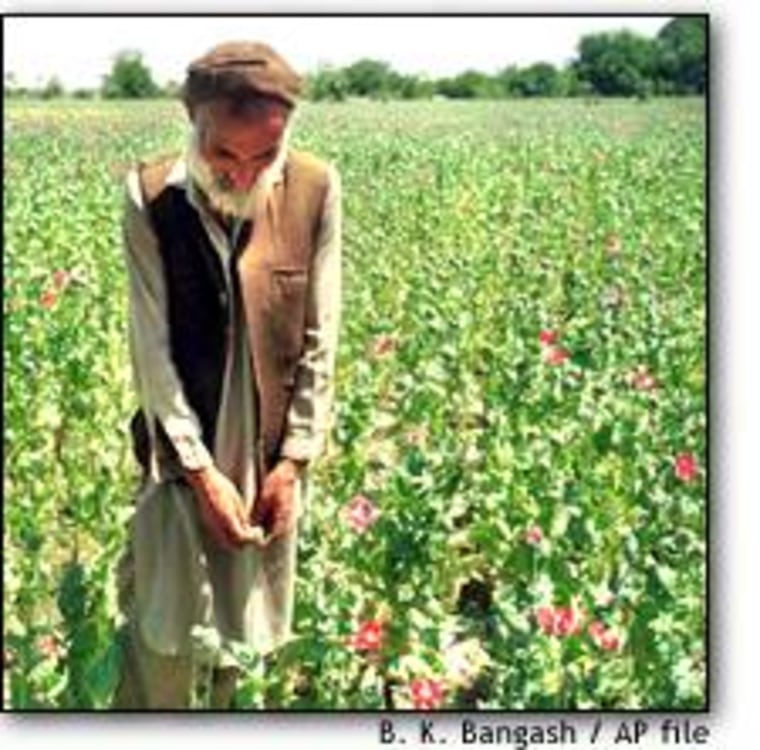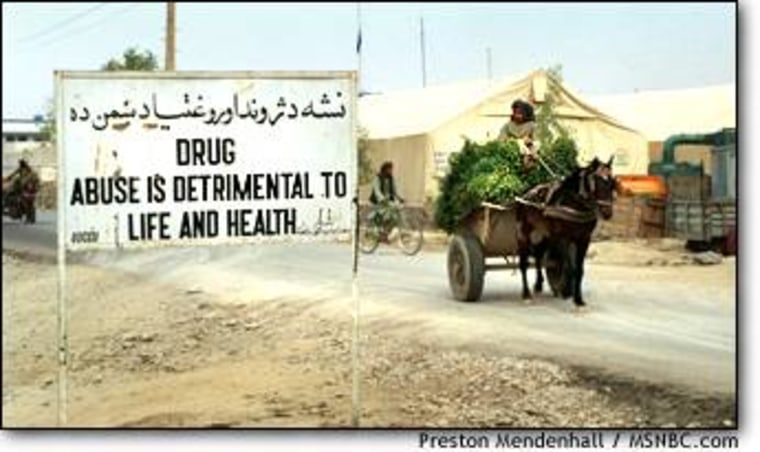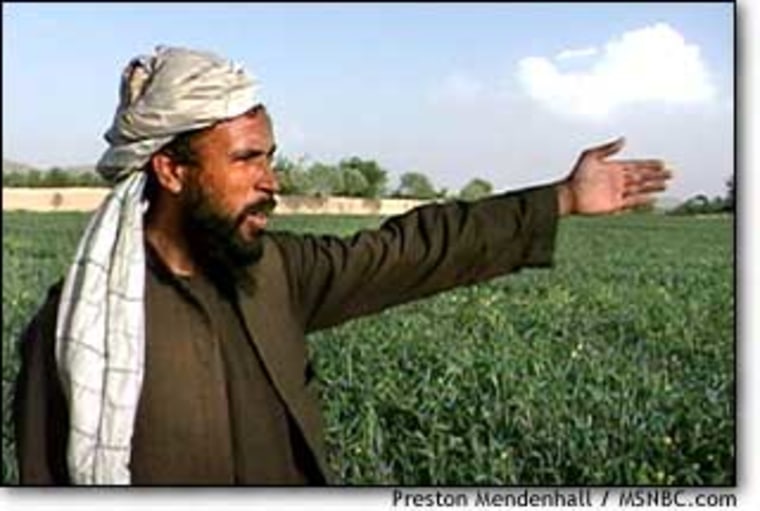There are few signs of wealth in Afghanistan, but farmer Mohammed Hasan’s shiny late-model Toyota is a dead giveaway. Hasan once grew Afghanistan’s premier cash crop, poppies from which opium is produced. This year is different. He may have to sell his car just to survive.
Last year, Afghanistan was the world’s largest opium producer, with 75 percent of the world’s crop, a staggering output of some 3,500 tons of one of the most addictive drugs on earth. The opium, a key ingredient in heroin, is smuggled into Europe and Asia, where it commands a fortune on international markets.
So stunning was Afghanistan’s opium production last year that the CIA estimates 39 percent of the world’s supply came from just a single province.
For years the ruling Taliban government relied on lucrative opium sales to fuel its war with opposition forces in the north. Farmers like Hasan earned thousands of dollars a year from their crops — a true fortune in a country where the average monthly income isonly a few dollars.
Drug growing deemed un-Islamic
But last July, the Taliban’s leader, Mullah Mohammed Omar, issued an extraordinary edict. It banned poppy cultivation in Afghanistan, calling drug production un-Islamic. Few in international law enforcement took Omar’s edict seriously — until now.
Earlier this month, an international delegation led by the United Nations Drug Control Program — which included two U.S. government narcotics experts —visited Afghanistan to study the impact of Omar’s ban.
Delegates told MSNBC.com that during the 10-day visit they found no evidence of poppy crops anywhere in the survey area, which concentrated on the biggest poppy-growing region of Afghanistan.
“There are no poppies,” said Bernard Frahi, the head of the U.N. program’s Afghanistan project. “It’s amazing.”
Ban cripples economy
That in less than a year Afghanistan has gone from being the biggest opium producer in the world to providing a trickle of the global supply may be the single-most successful drug moratorium in modern history.
But relief officials and former poppy farmers interviewed by MSNBC.com said the Taliban’s uncompromising approach to the opium ban, rather than a phased reduction in the crop, is having a devastating effect on the country’s economy.
“It was not a good year to ban poppies,” said one senior aid official, who spoke on condition of anonymity. “They are drought resistant, labor intensive — that’s to say, a sector that employed large numbers of people — and the farmers used every part of the poppy, for fuel and fodder.”
Farmers try wheat
In Waziran, 15 miles north of Kandahar, lie some of the 90,000 acres of former poppy fields that flourished in Afghanistan. Much of the land has been replanted with wheat.

“From a farming point of view, poppy cultivation is much better than any crop,” said Hasan, who owns 25 acres in Waziran. “We could plant and harvest twice a year, and then plant fast-growing crops like watermelons after that. With wheat, we can’t break even.”
A 2-year-old drought — and high fuel costs to power irrigation pumps even when water is available — spells doom for the farm and its workers, Hasan said.
“Most of my workers left to find jobs in the city. They didn’t, so they came back. But I can’t pay them.”
Hasan said he never considered violating the ban, although he admits to keeping some of last year’s opium crop hidden in case the situation becomes dire. But even small infractions have consequences. A neighbor who grew a small patch of poppies spent a month in jail until Hasan bailed him out.
Taliban furious over world silence
The international community has shunned Afghanistan’s Islamic rulers over their human rights violations and their harboring of Osama bin Laden, the Saudi exile Washington blames for masterminding bombing attacks on U.S. interests. It also has remained silent about Afghanistan’s drug ban, outraging the Taliban.
Afghanistan’s ambassador at large, Rehmatullah Aga, told MSNBC.com that the failure of the West to praise the poppy ban in any way has made Afghanistan’s leaders more suspicious of the overall intentions of the international community.
U.S. may be ready to help farmers
But the United States, which has preached its anti-drug message around the globe and praised the eradication efforts of other countries, may break the silence soon.
The U.N. poppy report, to be issued at the end of May, will conclude that “the ban was very effective,” says James Callahan of the State Department’s Bureau for International Narcotics and Law Enforcement Affairs.

“I would be surprised if there were more than a few (acres) of poppies in Taliban-controlled areas this year,” Callahan, a member of the delegation that visited Afghanistan, told MSNBC.com in an interview. “We hope to both increase U.S. assistance and to try to rally international opinion and other donors to increase humanitarian assistance to these farmers.”
Yearning for the good old days
But with farmers facing an unending drought and a poor wheat harvest this year, Callahan said it’s too early to tell whether the Taliban can keep the country from returning to the lucrative poppy crop.
Many farmers are already yearning for the good old days.
“We want to grow poppies again,” said 55-year-old Sardar Mohammed, an out-of-work field laborer, pointing to barren land once filled with Afghanistan’s cash crop. “Poppies were our survival.”
Preston Mendenhall is MSNBC.com’s international editor. NBC’s Robert Windrem contributed to this report.
